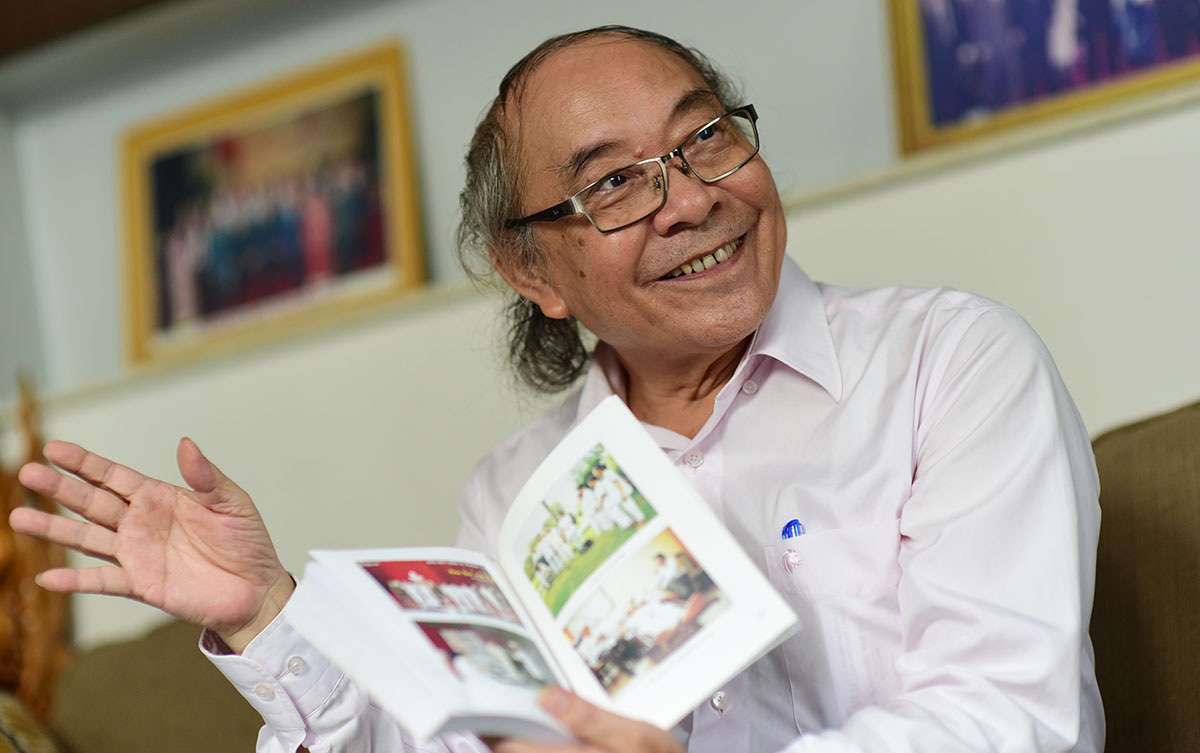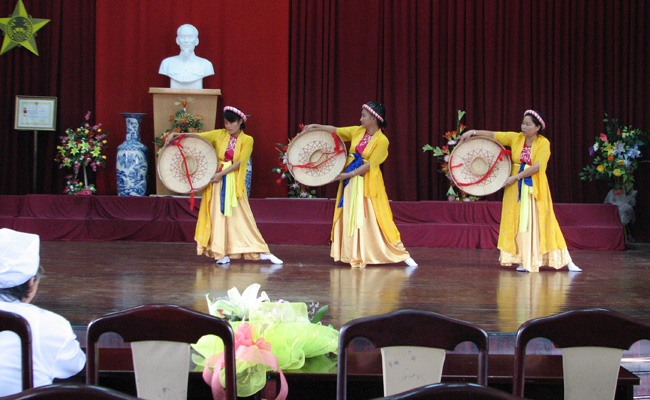A revered psychiatrist and music composer has spent several decades using a combination of medicine and music therapy to help his patients tread on the path toward leading normal lives.
Modest by nature, Dr. Nguyen Tho, 71, has helped dozens of patients throughout Ho Chi Minh City and neighboring provinces overcome mental illness through a series of both conventional treatment and what he has developed over his extensive career.
Dr. Tho, a former director of the National Mental Hospital 2, 30 kilometers from Ho Chi Minh City in Bien Hoa City, currently works at the hospital as the deputy head of the National Institute of Forensic Psychiatry, where he has helped many people overcome their mental illnesses with his ground-breaking use of music therapy.
Music therapy is a method of treatment in which a health professional uses music to address a patient’s physical, emotional, cognitive, and social needs.
By assessing each individual client’s strengths and needs, a qualified music therapist can prescribe treatments which include singing, dancing, and listening to music.
Through musical involvement in the therapeutic context, clients' abilities are strengthened and transferred to other areas of their lives, according to the American Music Therapy Association.
The doctor, who has been honored with the titles of 'Meritorious Doctor' and 'People’s Doctor,' also works as the Dean of the Medicine and Pharmacy Faculty at Van Lang University in Ho Chi Minh City.
Thus far in his extensive career, Dr. Tho’s music-based treatment methods seem to have worked miracles for people suffering all sorts of mental health problems, including grief and shock from family issues, the loss of a loved one, and business failures.
Part of what makes his therapy so special is that each treatment course culminates in a jaw-dropping performances by his patients to showcase their progress.
In addition to treating patients with music, Tho himself is also a composer with about 100 self-written musical works under his belt.
Making more of music
Dr. Tho first decided to incorporate music into his career about 50 years ago when a song he co-authored with two of his classmates at the then-Vietnam Military Medical University, 'Tuoi 20' (20 Years Old), began gaining popularity amongst the student body.
Tuoi 20 became an iconic piece at school events over the next few years. Its success was a major inspiration for Tho to continue making music.
A few years later, at a meeting with an influential doctor at the 108 Military Central Hospital, Tho was exposed to music therapy as a means to heal mental illness.
Still, it took several more years until he was promoted to the management team of National Mental Hospital 2 in 2000 and was able to put his avant-garde approach to mental health into practice.
“Music is a great emotional outlet and has its own allure. Except for acute mental patients who need immediate treatment, others, once in stable condition, can use music to freely express long-suppressed anguish over their family, love, or business affairs,” Tho explained.
Tho’s music therapy incorporates a range of different genres, particularly those he feels his patients might have deep connections with, such as symphonies performed using instruments from ethnic minority groups in the Central Highlands such as the t’rung and k’longput (traditional bamboo xylophones), as well as popular folk tunes from southern Vietnam.
He also does his best to include dancing, painting, and aerobics into his treatment.
The treatment process
His music therapy treatment typically begins by dividing his patients into groups. Within each group, patients are taught to sing and play instruments, including wooden and bamboo percussion instruments, drums, guitars, and harmonicas.
As the skills of each patient progress, Tho and his colleagues track their improvement based off a number of benchmarks, such as compliance and behavior, in order to prepare for intervention in case a patient begins to regress.
As part of the process, Tho and his team spend a great deal of time persuading their patients of the efficacy of music therapy.
“At the inception of their treatment, most patients show anxiety and objection. They want to give up because they are shy, embarrassed, or simply just are annoyed with themselves for singing off-tune or out of beat. It’s only when the treatment is going seamlessly that they begin to feel more at ease and start to smile,” Tho shared.
The treatment itself takes several weeks, but eventually, Tho and his students are able to perform in unison and the entire group puts on a recital for their families, complete with solos, duets, small group performances, and even chorally.
|
|
| Three patients perform a dance during their treatment with Dr. Nguyen Tho’s music therapy in this provided photo. |
The miracle of music
“Thanks to music, the patients are able to return to normalcy. Music therapy helps with their overall physical and mental rehabilitation, results in behavior changes, and awakens the dormant subconscious,” Tho said.
For Tho, therapy is not just about teaching his patients to heal through a new skill, it is about truly understanding and building connections.
One of these patients is H.T.H.T., a 20-year-old woman from the south-central province of PhuvYen, who was suffering from an emotional disorder and depression following her parents’ separation.
The separation had caused the once academically brilliant girl to shy away from others and begin showing signs of serious distress.
“I once attempted suicide but was rushed to hospital in time. I began to realize that I am faring better than many others here. I miss my mom now and want to go home to help her out,” T. shared.
L.H.P., a 31-year-old from District 8 in Ho Chi Minh City, is another patient whose symptoms were brought on by his parents' divorce and his subsequent stint staying with his aunt and uncle.
Deprived of parental care and a proper education, P. started drinking and doing drugs. He began living on the streets until one day he found himself in the mental hospital.
On his darkest days, the only thing that kept him going was his skills on the keyboard. Though he had a long way to go to perfect the instrument, the nine weeks he spent practicing also helped him keep his mind off drugs and alcohol.
“I’m trying to stay clean. I feel much better now and have come to see life in a positive way,” P. said, adding that his dream now is to become a music composer, just like his mentor.
Nguyen Tho, 71, is a member of the Vietnam Artist Association and has composed approximately 100 songs and won several awards over the course of his career.
He published a book on the applications of music and psychological therapy in mental illness treatment in 2009.
Like us on Facebook or follow us on Twitter to get the latest news about Vietnam!




















































